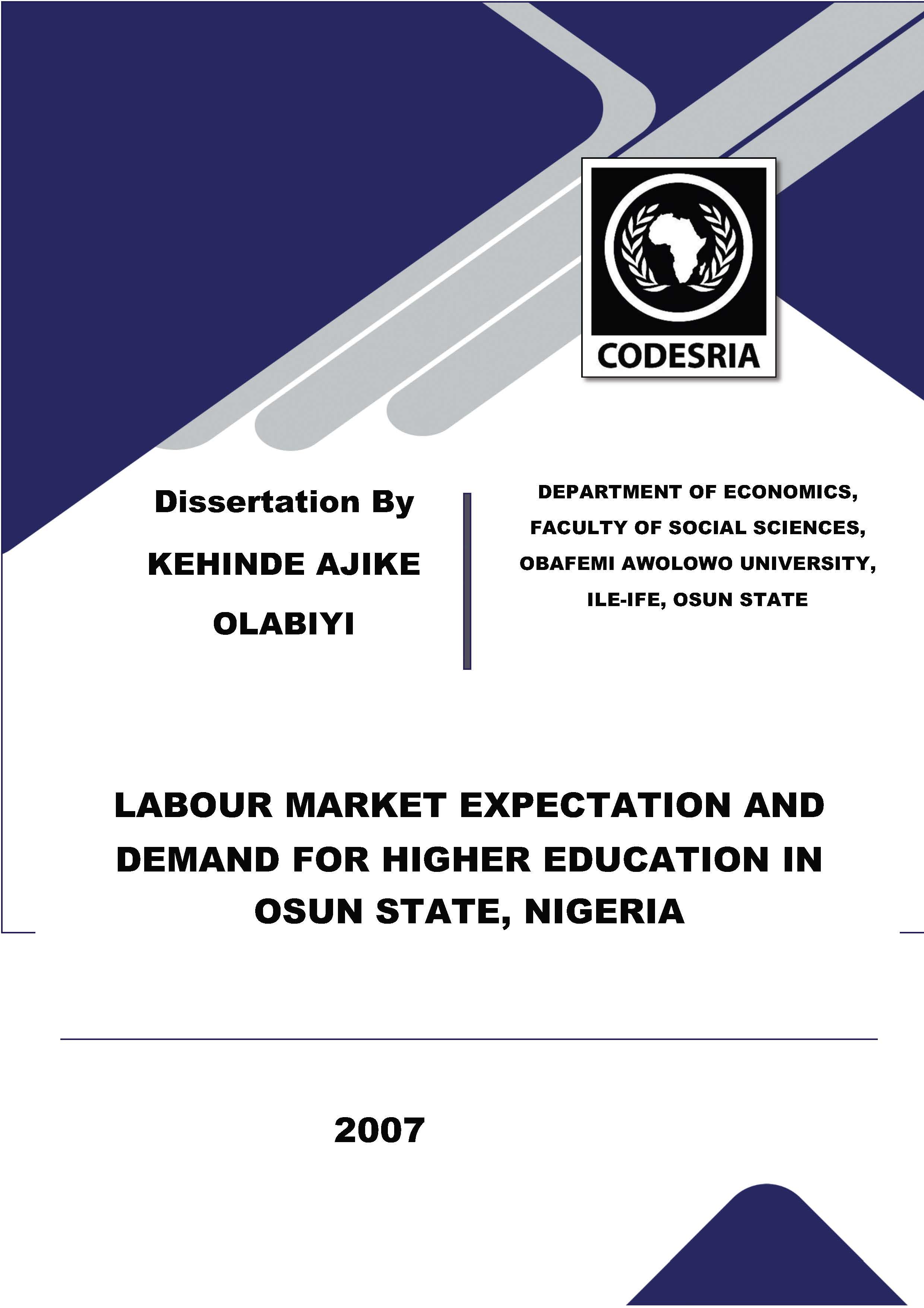LABOUR MARKET EXPECTATION AND DEMAND FOR HIGHER EDUCATION IN OSUN STATE, NIGERIA
Keywords:
Labour market, unemployment, supply and demand, higher, education, labour supply, job searching, Osun State, NigeriaSynopsis
The study examined the changing labour market expectations at different educational levels and analyzed how the expectations had informed decision for higher education in Osun State. This was with a view to providing insight into the intensity of demand for higher education.
The data for the study were obtained from primary and secondary sources. The primary data were generated from a survey of a purposefully sampled final year students of Senior Secondary Schools; final year students of tertiary institutions; currently serving National Youth Service Corps members and postgraduate students. These were drawn from selected six survey areas in Osun State, namely Ile-Ife, Osogbo, Ilesha, Ire, Ede and Esa-Oke. One private and one public secondary school were selected from the survey areas and forty students were randomly sampled from each of the schools. A total of 1430 students were randomly sampled from the five selected tertiary institutions in the survey areas. The five tertiary institutions were: Obafemi Awolowo University, Ile-Ife; Osun State College of Education, Ilesha; Osun State College of Education, Esa-Oke; Federal Polytechnic, Ede; and Osun State Polytechnic, Ire. Twenty-five National Youth Service Corps members from each of the survey areas who were about entering the labour market were contacted during their weekly Community Development Programme for the survey. Also, 165 Post graduate students were randomly selected across all the faculties of learning in Obafemi Awolowo University for the study. A total of 2,225 respondents were sampled in the study. The secondary data were collected from the publications of Federal Office of Statistics and National University Commission (NUC) Statistical Digest. The data were analyzed using descriptive and econometric technique.
Downloads
References
Adebayo, A. A. (1989): Labour Market Expectations of Nigerian University Graduates. Obafemi Awolowo University, Ile-Ife. Unpublished project, Ile –Ife.
Adebayo, A. A. (2000): “Labour market Experience of Nigerian Tertiary Graduate Job –Seekers.” Manpower Journal Vol XXXXVI, No3, October - December (ISSN 0542- 5808.
Adesina, S. et al (1983): Nigerian Education Trends and Issues. University of Ibadan Press Ltd.
Akerele, W. O. and Opatola, A. O. (2004); Higher Education and the Labour Market in Nigeria. The final report submitted to African Economic Research consortium, Nairobi, Kenya, Dec.
Ashby, S.E (1960); “ Investment in Education. Report of the commission on post-school certification and higher Education in Nigeria” Federal Ministry of Information, Lagos.
Ayiku M.N.B (1991): University Productive Sector Linkages. Review of the State of the Art in Africa IDRC, Canada.
Azura D. (1948): “Chroncade cuhe in C.P. Groves”. The Planning of Christianty in Africa, Vol 1.
Becker, G. S. (1962); “Investment in human capital: A theoretical perspective”, Journal of political Economy, vol.70 (5).
Berger, M. (1988): Predicted future earnings and choice of college major. Industrial and Labour Relations Review. 41. 418-429.
Betts, J. R. (1996): “What do students know about wages? Evidence from a survey of Undergraduates The Journal of Human Resources Vol. 31.






